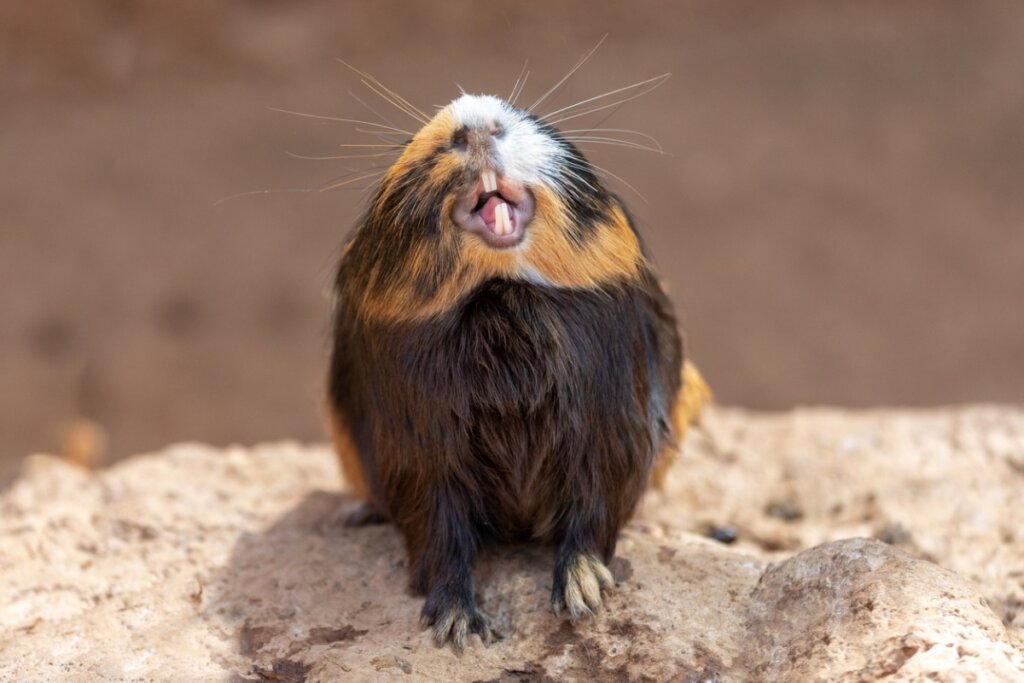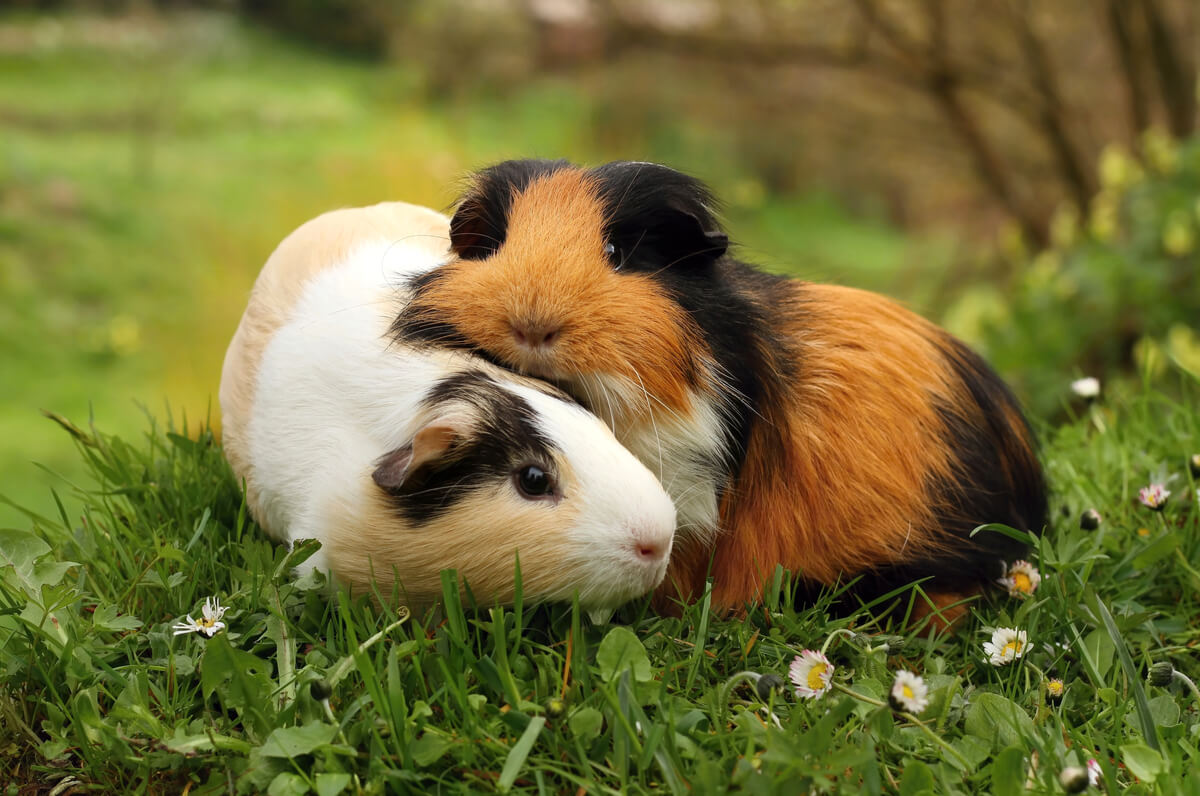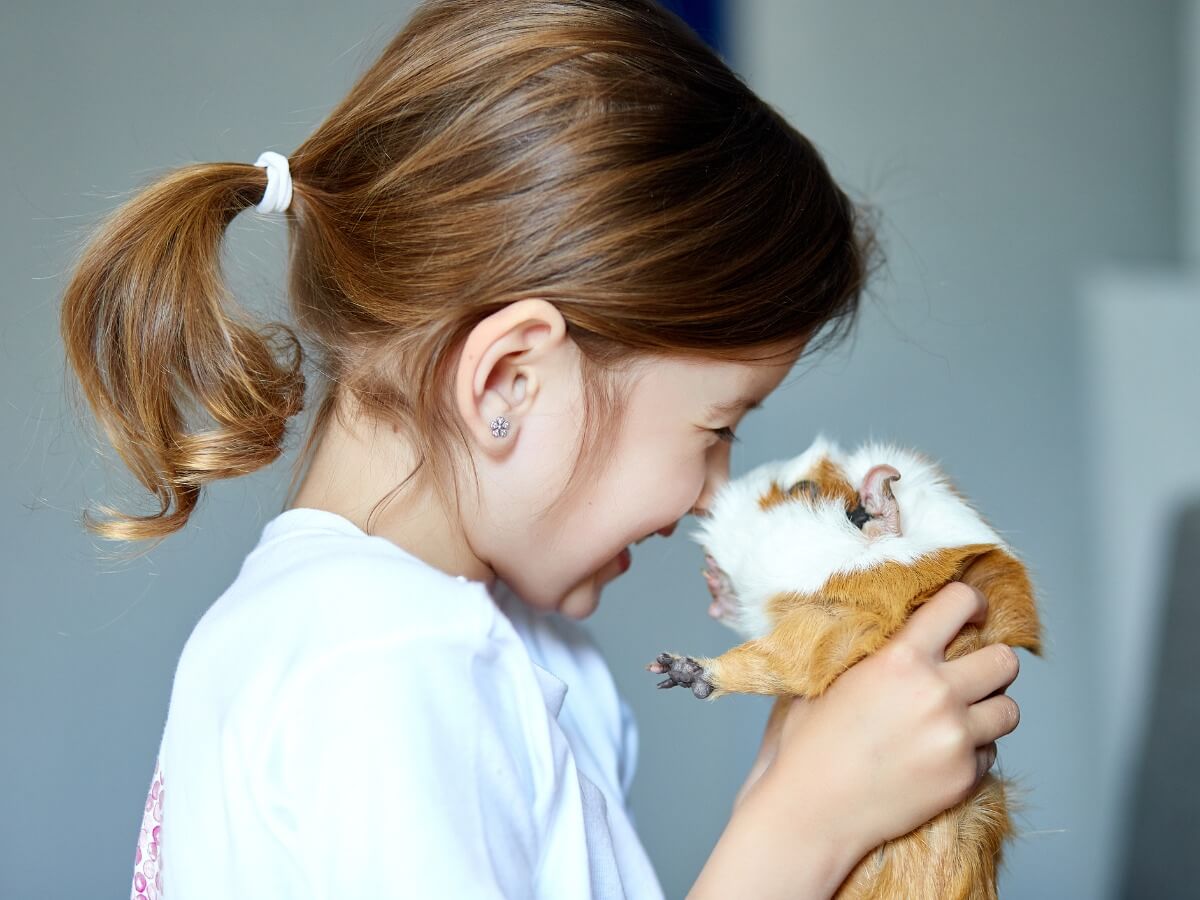Do Guinea Pigs Bite?

Guinea pigs are cute and cuddly animals, but many people often wonder whether they bite or not. These creatures are quite skittish, so in a situation of stress or danger they run away and aren’t aggressive at all.
Guinea pigs (Cavia porcellus) are rodents that come from the Peruvian-Bolivian Andes and belong to the family of the Caviidae. They’re herbivorous, sociable, and affectionate animals when they’re able to establish bonds. These small mammals have only 4 incisors (2 on the top and 2 on the bottom) and come in a variety of colors.
In addition, these rodents have molars that aren’t visible and rub against the top of the throat. As with rabbits and other rodents, their teeth never stop growing. Read on to find out if guinea pigs bite or not.
Do guinea pigs bite people?
Guinea pigs need to bite to file down their incisor teeth, as these never stop growing. However, they’re unlikely to bite people, although physically they do have the ability to do so.
When faced with a stressful situation, guinea pigs seek reassurance in their caregiver’s hands and lick their fingers. It must be said that they’re very calm, so, in order to bite, they have to feel in danger. In any case, their initial reaction will always be to avoid confrontation.
These little rodents are very friendly and once they recognize their guardian they “greet” them with a very particular whistle.

Why do guinea pigs bite?
As mentioned, guinea pigs will bite people if they feel in danger or in uncomfortable situations, such as the following scenarios:
- Learning and reinforcement: This creature is very intelligent, so it can learn in which situations it should bite. For example, if the guardian doesn’t feel safe when holding the guinea pig, the guinea pig will sense it and bite to get the guardian to let go.
- Treat craving: It’s important that the owner washes their hands thoroughly after eating before holding the guinea pig. If they smell treats or vegetables, they’ll get a bit over-excited and may bite your hand. Keep in mind that these rodents are short-sighted and won’t know the difference between your carrot-scented fingers and a real carrot.
- Illness: If the pet has a condition that causes it pain, an allergy, or a skin disease such as scabies, it may bite the human when they’re trying to pet it.
- Insecurity in the new home: It’s normal for a new environment and unfamiliar people to make the guinea pig feel nervous as it becomes familiar with its new surroundings. It’s also to be expected that they’ll tend to bite when they’re going to be petted. Gradually, you have to convey security, and the guinea pig will start to adapt to its new home.
- Fright: If you have the guinea pig in your hands and something happens that upsets it, the fright may startle it and it may bite.
Do guinea pigs bite wires or furniture?
Guinea pigs love to bite, as they are rodents after all. In addition, their incisor teeth justify this activity because they’re constantly growing. Therefore, if your pet doesn’t have their own toys and snacks, then they may begin to bite any furniture and wires that they find along the way.
As gnawing is an instinctive behavior in these animals, it’s best to adapt the guinea pig’s area so that it doesn’t turn to utensils and other things that it shouldn’t bite. Not only because it will damage your decorative items, but also because it could be electrocuted if it chews on a wire that’s connected to the power.
Why do guinea pigs chew their cage?
Guinea pigs chew their cage for different reasons, among them because they feel lonely or bored. Before adopting one of these pets, keep in mind that they’re very active, love to run, and need to play. Therefore, when they spend too much time locked up they become anxious and start chewing the elements of your home.
On the other hand, the owner should also consider that, if they begin to gnaw the cage, they may be suffering from stress or pain. The first thing to do is to consult a veterinarian to rule out health conditions. It’s also necessary in these cases to evaluate the conditions of the area and move the cage away from the source of anxiety.
Types of guinea pig bites
Before being alarmed by the bite of a guinea pig, you should know the types of bite that it may give. This way you can classify their behavior and know how to correct it. Here are some examples
- Biting by mistake: This can happen when the human offers a treat to the rodent or when your hands smells of food. In this case, there’s no intention to bite.
- Feeling uncomfortable: If the pet feels uncomfortable with the person who has taken it in his hands, they’ll bite with the intention of expressing how they’re feeling. This may happen if they’re being held by someone they don’t know, or if their owner is brushing their hair and causes them pain. In that case, it will bite hard and try to escape.
- Aggressive: This type of biting is a sign of aggression and antisocial behavior. It means that the guinea pig is very afraid of the owner, and so you have to work on the bonds of trust.
- Nipping: This is common behavior among guinea pigs and they carry it out as a way of defense. In addition, they learn it from their mother when she tries to finish breastfeeding and in moments of scolding. Therefore, it’s normal for them to replicate this behavior with the guardian. It’s important to recognize that this biting isn’t aggressive.
How to prevent your guinea pig from biting?
To prevent guinea pigs from biting, you have to work on the bonds of trust (when possible health problems have been ruled out). Here are some of the things you can do to achieve this:
- Treat your guinea pig with respect, don’t scare it on purpose, and don’t stress it out.
- When you want to approach it, do so calmly and speak to them quietly while stroking its back.
- Offer them fresh vegetables and allow them to take food from your hand without forcing the animal.
- If you notice that it doesn’t want you to pick it up when it’s inside the cage, don’t force it, as it’ll try to bite you.
- When it has accepted your hand, pet the guinea pig calmly and safely. Touch its head and the tip of its nose.
Reactions to biting
Learning how to react when a guinea pig bites you is important, as it will influence their learning process. Don’t let it go after a bite, as it’ll learn that this is enough to enable it to run away. It’ll then do it time and time again without thinking that it may hurt itself when it falls out of your hands.
Remain calm after it has bitten you (even if you’re bleeding), breathe clamly, and don’t let go of your guinea pig. Talk to it and pet it, then put it in its cage and treat the wound on your own. Never let the animal go, as this is the only thing it wants when it performs this aggressive act.

Guinea pigs bite instinctively, but this isn’t always a sign of aggression. They do it to file their teeth, to de-stress, and to have fun. Only at times when they feel insecure or in danger will they bite their owner, but it’s rare for them to do so continuously.
All cited sources were thoroughly reviewed by our team to ensure their quality, reliability, currency, and validity. The bibliography of this article was considered reliable and of academic or scientific accuracy.
- Cuidados y mantenimiento de cobayas. Clínica Veterinaria Madagascar.
- Yagi, T., Morimoto, T., Hidaka, O., Iwata, K., Masuda, Y., Kobayashi, M., & Takada, K. (2003). Adjustment of the occlusal vertical dimension in the bite-raised guinea pig. Journal of dental research, 82(2), 127-130.
